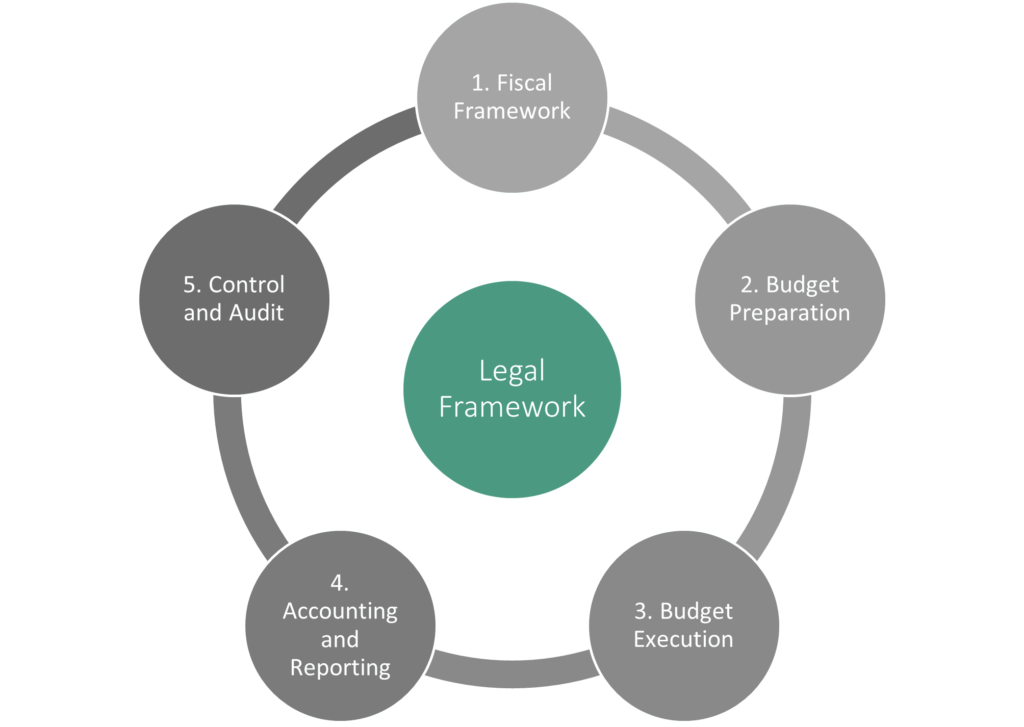Public Financial Management (PFM) is the process by which governments raise and spend public funds. It encompasses everything from budgeting, revenue collection, and expenditure management to treasury operations, auditing and civil service management. The budget cycle is the series of steps that governments follow to prepare, approve and implement their annual budgets.
PFM and the budget cycle are intimately linked. A well-functioning PFM system is essential for a successful budget cycle, and vice versa. That’s why we’ve put together this blog post on PFM and the budget cycle. We hope it will provide some helpful insights into how these two important concepts work.
What is Public Financial Management?
Public financial management (PFM) refers to the collection, management and expenditure of public finances throughout an economy. Strong PFM processes and systems are essential for effective and efficient delivery of public services, transparent public finances, and trust between government and citizens.
PFM processes help ensure that government resources are used in a way that is accountable to the public. In order to be effective, PFM must take into account the macroeconomic context in which it operates. It is also important for PFM to be responsive to the needs of different stakeholders, including citizens, parliamentarians, the media, and civil society.
There are a number of challenges that must be addressed in order to strengthen PFM. These include improving budget formulation, execution, and reporting; enhancing transparency and accountability; and strengthening institutional capacity.
Public financial management is critical to the effective and efficient use of public resources. It is essential for good governance and plays a key role in achieving economic development and poverty reduction goals. With the right policies and processes in place, PFM can help ensure that government resources are used effectively to improve the lives of citizens.
What is the Budget Cycle?
PFM is budget driven in that the budget represents the legal embodiment of government intentions. The budget is the key policy document that sets out the government’s revenue and expenditure plans for a given period of time.
Government budgeting is cyclical with four distinct phases:
- Preparation
- Approval
- Execution
- Oversight
Working through these phases in a cyclical manner helps governments to be held accountable.

Budget Preparation
Budget preparation is the process of developing the government’s revenue and expenditure plans for a given fiscal year. The budget must be prepared in line with the laws and regulations of the country.
Budget preparation starts with the formulation of economic and fiscal policy. The government’s overall economic and fiscal objectives are set during this phase. This is followed by the development of sectoral plans, which set out the specific revenue and expenditure plans for each government ministry, department, or agency.
Budget Approval
The budget must be submitted to parliament for approval before it can be implemented. In some countries, the budget must also be approved by the president or another head of state. Once approved the budget becomes the Budget Law for that period.
Budget Execution
Budget execution is the process of implementing the approved budget. This involves the collection of revenue, the allocation and disbursement of funds, and the management of public expenditure.
Revenue collection is managed by the Ministry of Finance. Funds are then allocated to different government ministries, departments, and agencies in line with the approved budget. Public expenditure is managed by the relevant government ministry or agency.
Budget Oversight
Budget oversight is the process of monitoring and evaluating budget implementation. This helps to ensure that resources are used effectively and efficiently.
Oversight takes place at both the national and local levels. National oversight bodies include parliament, the supreme audit institution, and civil society organizations. Local oversight bodies include municipal councils and community groups.
The budget cycle is an important part of public financial management. It helps to ensure that government resources are used effectively and efficiently. By following the budget cycle, PFM can help to improve citizen wellbeing – and that’s where FreeBalance comes into it.
How Does FreeBalance Support PFM?
FreeBalance is a purpose-led organization dedicated to improving citizen wellbeing and combating corruption around the world. Our team built the world’s first global Government Resource Planning (GRP) system – the FreeBalance Accountability Suite™ – which is used in 25+ countries to manage over $400 billion budget dollars.
The FreeBalance Accountability Suite™ covers the entire budget cycle, manages all critical government fiscal systems, and enables more effective PFM by:
- Linking budget and accounting processes to ensure that expenditures seamlessly match the budget law
- Identifying outcomes from previous fiscal years to improve results for the current year
- Integrating forecasts, trends and commitments to improve the use of cash and investments
- Determining key performance indicators to enable improved budget execution

Full automation of the budget cycle provides necessary information to government decision-makers. It enables comparing across multiple years and among governments and it dramatically improves budget execution, enabling governments to deliver improved results.
FreeBalance’s GRP solution for central, regional and local governments provides predictability and control over budget execution, sound public finances and greater fiscal stability through improved transparency and accountability. The FreeBalance Accountability Suite™ can be equally effectively be used in other public sector verticals such as public health, transport, utilities and social services.
